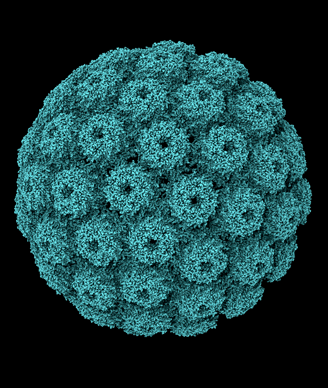Possible Association Between Simian Virus 40 and NHL Found
Researchers have found immunologic evidence that simian virus 40 (SV40) may be associated with non-Hodgkin lymphoma (NHL).
Simian virus 40. Image © Bitcyte / Shutterstock.com.

Researchers have found immunologic evidence that simian virus 40 (SV40) may be associated with non-Hodgkin lymphoma (NHL).
In a study published in Cancer, patients with non-Hodgkin lymphoma given synthetic peptides that mimic SV40 had much higher levels of detectable antibodies against the virus than did a group of patients with breast cancer, nasopharyngeal cancer, or control patients.
“SV40 is a small DNA tumor virus; its sequences have been detected mainly by polymerase chain reaction techniques in NHL,” wrote Mauro Tognon, PhD, of the University of Ferrara, Italy, and colleagues. “This result suggests that the viral agent with oncogenic potential may participate, probably as a cofactor, in the genesis of NHL.”
According to the study, it has been suggested that viruses with “oncogenic potential” may play a role in the cell multiplication or the inflammation that modifies the microenvironment and leads to lymphoma.
In this analysis, Tognon and colleagues used an indirect enzyme-linked immunosorbent assay with two synthetic peptides that mimic SV40 antigens of viral capsid proteins 1 to 3 in order to detect the presence of antibodies against SV40. They tested this response in two cohorts of patients with lymphoma (NHL1: n = 89; NHL2: n = 61) and then compared the results with a group of patients with breast cancer (n = 78), nasopharyngeal cancer (n = 64), and three groups of control patients.
Using serum samples, the researchers were able to detect antibodies to SV40 in 40% of patients in NHL1 and 43% of patients in NHL2. This prevalence was significantly greater than that seen in the patients with breast cancer (15%; P < .001) or those patients with nasopharyngeal carcinoma (25%; P < .05).
The rates of antibodies were also significantly greater in patients with NHL than they were in the group of healthy subjects of the same median age as the NHL patients. The prevalence was 16% for the first cohort of healthy subjects with a median age of 57 years, and was 14% for the second group with a median age of 65 years.
The researchers posited that despite this association with SV40 antibodies, SV40 may serve as a passenger virus that multiply in NHL cells without actually causing the onset of the disease.
“The presence of SV40 antibodies, with a high prevalence, in serum samples from NHL patients is not proof of cause/effect in the genesis of this lymphoproliferative disorder,” the researchers wrote. “If SV40 is oncogenic in humans, new therapeutic approaches may be used with antiviral compounds or innovative therapies. In the next investigation, SV40 sequences and Tag expression together with an analysis of serum antibodies against SV40 will be studied in the same NHL samples.”